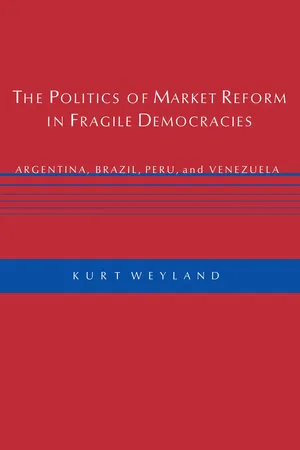
The Politics of Market Reform in Fragile Democracies
Argentina, Brazil, Peru, and Venezuela
- English
- PDF
- Available on iOS & Android
The Politics of Market Reform in Fragile Democracies
Argentina, Brazil, Peru, and Venezuela
About this book
This book takes a powerful new approach to a question central to comparative politics and economics: Why do some leaders of fragile democracies attain political success--culminating in reelection victories--when pursuing drastic, painful economic reforms while others see their political careers implode? Kurt Weyland examines, in particular, the surprising willingness of presidents in four Latin American countries to enact daring reforms and the unexpected resultant popular support. He argues that only with the robust cognitive-psychological insights of prospect theory can one fully account for the twists and turns of politics and economic policy in Argentina, Brazil, Peru, and Venezuela during the 1980s and 1990s.
Assessing conventional approaches such as rational choice, Weyland concludes that prospect theory is vital to any systematic attempt to understand the politics of market reform. Under this theory, if actors perceive themselves to be in a losing situation they are inclined toward risks; if they see a winning situation around them, they prefer caution.
In Latin America, Weyland finds, where the public faced an open crisis it backed draconian reforms. And where such reforms yielded an apparent economic recovery, many citizens and their leaders perceived prospects of gains. Successful leaders thus won reelection and the new market model achieved political sustainability. Weyland concludes this accessible book by considering when his novel approach can be used to study crises generally and how it might be applied to a wider range of cases from Latin America, Africa, and Eastern Europe.
Frequently asked questions
- Essential is ideal for learners and professionals who enjoy exploring a wide range of subjects. Access the Essential Library with 800,000+ trusted titles and best-sellers across business, personal growth, and the humanities. Includes unlimited reading time and Standard Read Aloud voice.
- Complete: Perfect for advanced learners and researchers needing full, unrestricted access. Unlock 1.4M+ books across hundreds of subjects, including academic and specialized titles. The Complete Plan also includes advanced features like Premium Read Aloud and Research Assistant.
Please note we cannot support devices running on iOS 13 and Android 7 or earlier. Learn more about using the app.
Information
Table of contents
- Cover Page
- Half-title Page
- Title Page
- Copyright Page
- Contents
- Figures and Tables
- Acronym
- Acknowledgments
- Chapter One: The Puzzle of Risky Reforms in Unstable Democracies
- Chapter Two: The Insufficiency of Existing Arguments
- Chapter Three: A New Explanation of Adjustment Politics
- Chapter Four: Economic Deterioration and Postponed Adjustment in the 1980s
- Chapter Five: The Initiation of Neoliberal Adjustment
- Chapter Six: Populist Politics and Economic Restructuring
- Chapter Seven: The Political Sustainability of Neoliberalism and Neopopulism in Argentina and Peru
- Chapter Eight: The Fitful Course of Market Reform in Brazil and Venezuela
- Chapter Nine: Theoretical Implications and Cross-Regional Perspectives
- Bibliography
- Index